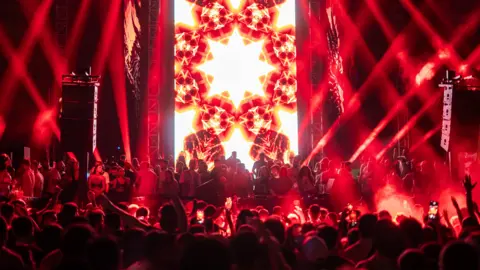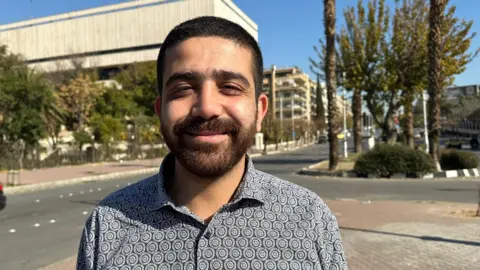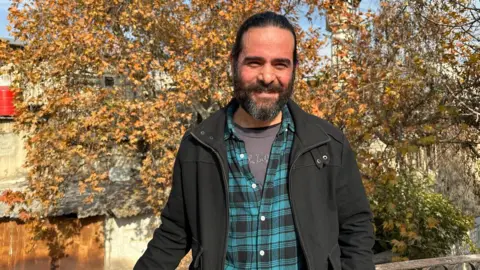
 This is an experience
This is an experienceAmid the scramble for a new Syria, the country's musicians are warily watching the leadership of the Islamist rebels and hoping to build on hard-won achievements during the nearly 14-year civil war.
The conflict gave energy and focus to the emerging heavy metal scene.
As the fighting subsided, a thriving industry of electronic music and dance performances rose from the ashes, sparking a resurgence in Syrian nightlife.
Now, its members are preparing to engage with a government led by Hay'at Tahrir al-Sham, or Hay'at Tahrir al-Sham – a group with roots in al-Qaeda and the Islamic State.
“We have to be organized before we go to them, because they are very organized,” said DJ and musician Maher Green. “We're willing to talk sense to them. We're willing to talk to them with a real proposal.”
Green said electronic music organizers found a way to talk to security services working for the former president.
He added, “They did not understand the gathering of 50 young men and women and dancing in this foolish way.” “We have developed a relationship with them over the years to make things go well and peacefully.”

The Assad regime was less tolerant of heavy metal rock singers who founded underground bands in the late 1990s and early 2000s.
They saw it as a subversive Western subculture associated with Satanism.
Nael Al-Hadidi, a music store owner, said, “I went to intelligence perhaps three times only because I sold this type of music.” “They made me sign some papers saying I wouldn't do it again.”
Scrutiny shifted when the brutal suppression of Syria's pro-democracy revolution sparked a bloody civil war.
Al-Hadidi said: “Before the war, even if you had long hair and wore black T-shirts, or metal dance shirts, security would arrest you. They suspected you of being satanic or something like that.”
“After the war started, they were too busy to dig like that. They were more afraid about political matters.”
This opened the way for the emergence of a vibrant metal scene, which is the subject of Munther Darwish's documentary entitled Syrian Metal is War.
The war may have revitalized metal bands, but it ultimately led to a mass exodus of musicians who felt the country no longer offered them a future.
“Ninety percent of my friends are now in Europe, the Netherlands and Germany,” Al-Hadidi said, shaking his head.
He found the best musician left, but he left music in 2011 when the killings began.
“It seems that any words I write,” he told me, “do not express what actually happened, and no words can express what was happening at that time.”

Only last year, Kher began performing and recording again. Now he wonders what Islamic leadership means for freedom of creativity.
“We have to be bolder,” he said in response to a question about whether he would remain out of sight until the situation became clearer.
“Our voice must be heard. We have to let all people know that we are here. We exist. It is not just the Islamic Front and the Islamic State here. I don’t think keeping a low profile under these circumstances is good for anyone.”
Khair was encouraged by the pragmatism shown in the days after the rebels seized power. He said: “Indicators indicate that we will fare better, we hope.”
But while he was speaking, we heard that Hay'at Tahrir al-Sham had closed the opera house. “Not a good sign,” Khair exclaimed, “if that's true.”
We rushed to the scene only to be told by officials outside that this was a false alarm, and that the venerable institution would reopen its doors a week after the rebel victory, along with other public buildings.
To be sure, Hay'at Tahrir al-Sham promises to respect rights and freedoms, declaring that it has long since broken with its extremist past.
He seems sensitive to the cosmopolitan culture of Damascus. State television began broadcasting Islamic songs last week but withdrew it in less than 24 hours when protests erupted on social media.

In the outside courtyard of the Opera House, Savannah Baqla was trying to perform revolutionary songs with the choir she was directing. The enthusiastic young men joined her, and she handed over her drum and allowed them to chant and sing.
“It may not be an easy road,” she said. “Maybe we will face some new obstacles, but we were used to facing corruption, and we had dictatorship, and we had secret police. We are still very optimistic about the future… because we have a very, very large group of people who are the opposition, artists, actors, musicians, composers and the future of Syria.”
But Al-Hadidi said they do not want to replace political tyranny with religious fundamentalism.
He added, “I hope that Hay'at Tahrir al-Sham will stick to its word about freedom, because we do not want to be another Afghanistan or another country ruled by a certain party or certain rulers who force you to (follow) some rules.”
Green, determined to remain part of Syria's future, said it was important for the artistic community to move quickly.
“It does not seem that (Hay’at Tahrir al-Sham) is ready to look for the cultural aspect in the first week of liberating Syria. They have a lot of problems, and they are looking for the economy, and they are looking for forming a new government.” He said.
“We're trying to organize ourselves before they start looking at the culture. In order to get there first, (we have to be) unified in our views.”
Like others here, Green experiments, mixing traditional Arabic music with electronic beats.
He said the culture of Islamic rebels “is religious songs and that's it.”
He added, “This is a little backwards for us. We were here in Syria before the war, and inside during the war, (when) we conducted a lot of experiments. We have developed a lot. We have a lot of mixed cultures.”
Syria's music scene has thrived and even thrived during the civil war, and now faces a new and unexpected test.









